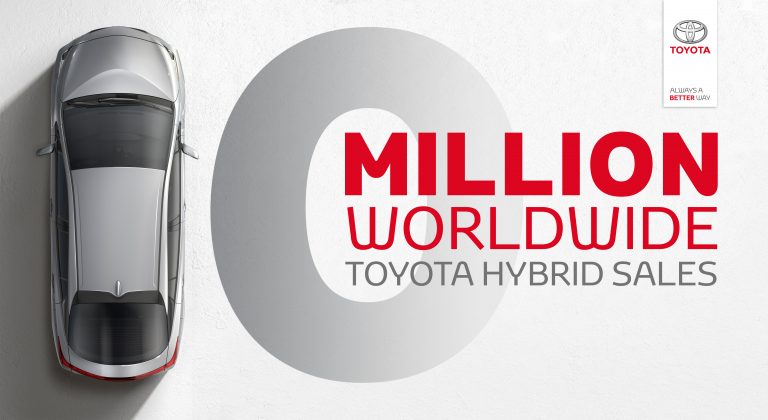Worldwide Sales of Toyota Hybrids Reach 10 Million
Toyota’s cumulative worldwide hybrid vehicle sales passed the 10 million mark1 on 31 January. More than just a numerical milestone, this achievement demonstrates the staying power of a technology that is emerging as a mainstream choice for helping reduce greenhouse gas emissions and other pollutants.
Helping to reduce the environmental impact of automobiles has long been a priority for Toyota. Believing that environmentally efficient vehicles can only truly make a significant, positive impact if they are widely used, Toyota has encouraged the mass-market adoption of hybrids around the world.
Toyota’s hybrid technology was first deployed in the Coaster Hybrid EV coach in August 1997, followed in December the same year by the original Prius, the world’s first mass-produced hybrid passenger car. Since then, Toyota’s hybrids have enjoyed growing popularity: the latest one million sales have been recorded in just nine months. There are currently 33 different Toyota and Lexus hybrid models worldwide and the technology is available to customers in more than 90 countries and regions.
UK hybrid sales
In the UK sales of Toyota and Lexus hybrid models have surpassed a quarter of a million since Prius was first sold here in 2000. Today there are seven Toyota hybrids on sale, a choice that most recently grew to include the new Toyota C-HR Hybrid crossover.
Lexus was the first luxury brand to offer customers hybrid power in the form of the RX 400h, introduced to Britain in 2005. Twelve years later hybrids make up almost 99 per cent of all Lexus UK sales, with eight different models available.
At the end of January this year, Toyota’s cumulative UK sales of Toyota and Lexus hybrids stood at 254,414 vehicles (174,861 Toyota, 79,553 Lexus).
Prius and Toyota’s environmental focus
Prius was Toyota’s response to growing global environmental concern about greenhouse gas emissions. The car’s development team was convinced that, whatever the results of their efforts, the development of a hybrid vehicle was essential and they had to do what was necessary, not simply what was possible. Prius proved popular and became a by-word for an “environmentally friendly” vehicle.
“When we launched Prius, no one even knew what a hybrid was,” said Takeshi Uchiyamada, Chairman of the Board of Directors at Toyota and popularly known as the father of Prius. “Those who drove it were called geeks or other names. Today, thanks to those early adopters who gave Prius a chance, hybrids have grown in popularity, and have ridden a wave of success out of the unknown and into the mainstream.
“We are grateful to each and every one of our customers who has helped us achieve this important milestone of 10 million hybrid sales. We are committed to continue working hand-in-hand with them to tackle global environmental issues.”
Toyota estimates that, as of 31 January this year, the use of Toyota hybrid vehicles2 in place of petrol-powered vehicles of similar size and performance, has results in approximately 77 million fewer tonnes of CO2 entering the atmosphere and has saved around 29 million litres of petrol3.
The Toyota Environmental Challenge 2050, announced in October 2015, set challenges to help reduce the global negative environmental impact of vehicles to as close to zero as possible and to contribute to the creation of a sustainable society. Hybrid continues to serve as a core environmental technology for the 21st century, providing a sound platform on which Toyota can develop new generations of vehicles that are kinder to the environment, using different fuel combinations, from battery electric vehicles to fuel cell hydrogen vehicles, such as the Mirai saloon.
1 including plug-in hybrids. 2 Excluding Coaster Hybrid EV and Quick Delivery 200. 3 Toyota calculation based on the number of registered vehicles × distance travelled × fuel efficiency (actual fuel efficiency in each country) × CO2 conversion factor.


